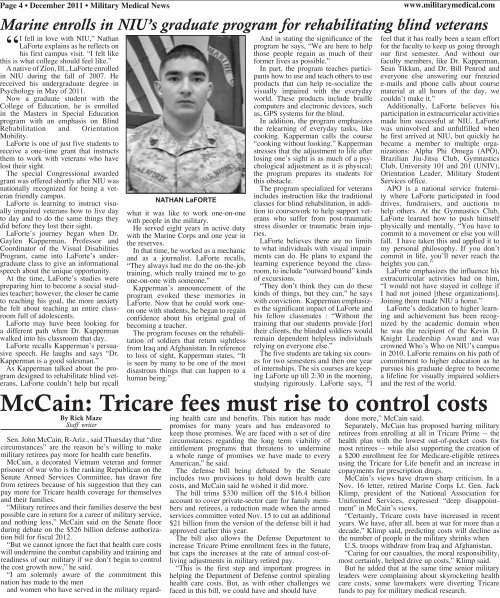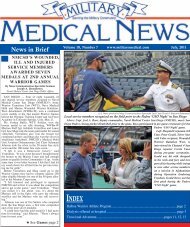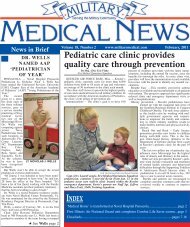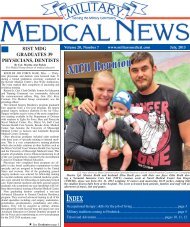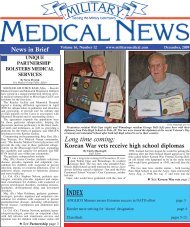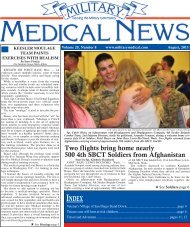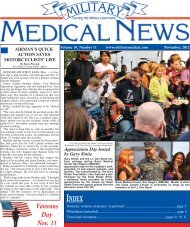Delivery unit has record-breaking baby boom - Military Medical | News
Delivery unit has record-breaking baby boom - Military Medical | News
Delivery unit has record-breaking baby boom - Military Medical | News
You also want an ePaper? Increase the reach of your titles
YUMPU automatically turns print PDFs into web optimized ePapers that Google loves.
Page 4 • December 2011 • <strong>Military</strong> <strong>Medical</strong> <strong>News</strong> www.militarymedical.com<br />
Marine enrolls in NIU’s graduate program for rehabilitating blind veterans<br />
“I fell in love with NIU,” Nathan<br />
LaForte explains as he reflects on<br />
his first campus visit. “I felt like<br />
this is what college should feel like.”<br />
A native of Zion, Ill., LaForte enrolled<br />
in NIU during the fall of 2007. He<br />
received his undergraduate degree in<br />
Psychology in May of 2011.<br />
Now a graduate student with the<br />
College of Education, he is enrolled<br />
in the Masters in Special Education<br />
program with an emp<strong>has</strong>is on Blind<br />
Rehabilitation and Orientation<br />
Mobility.<br />
LaForte is one of just five students to<br />
receive a one-time grant that instructs<br />
them to work with veterans who have<br />
lost their sight.<br />
The special Congressional awarded<br />
grant was offered shortly after NIU was<br />
nationally recognized for being a veteran<br />
friendly campus.<br />
LaForte is learning to instruct visually<br />
impaired veterans how to live day<br />
to day and to do the same things they<br />
did before they lost their sight.<br />
LaForte’s journey began when Dr.<br />
Gaylen Kapperman, Professor and<br />
Coordinator of the Visual Disabilities<br />
Program, came into LaForte’s undergraduate<br />
class to give an informational<br />
speech about the unique opport<strong>unit</strong>y.<br />
At the time, LaForte’s studies were<br />
preparing him to become a social studies<br />
teacher; however, the closer he came<br />
to reaching his goal, the more anxiety<br />
he felt about teaching an entire classroom<br />
full of adolescents.<br />
LaForte may have been looking for<br />
a different path when Dr. Kapperman<br />
walked into his classroom that day.<br />
LaForte recalls Kapperman’s persuasive<br />
speech. He laughs and says “Dr.<br />
Kapperman is a good salesman.”<br />
As Kapperman talked about the program<br />
designed to rehabilitate blind veterans,<br />
LaForte couldn’t help but recall<br />
NATHAN LaFORTE<br />
what it was like to work one-on-one<br />
with people in the military.<br />
He served eight years in active duty<br />
with the Marine Corps and one year in<br />
the reserves.<br />
In that time, he worked as a mechanic<br />
and as a journalist. LaForte recalls,<br />
“They always had me do the on-the-job<br />
training, which really trained me to go<br />
one-on-one with someone.”<br />
Kapperman’s announcement of the<br />
program evoked these memories in<br />
LaForte. Now that he could work oneon<br />
one with students, he began to regain<br />
confidence about his original goal of<br />
becoming a teacher.<br />
The program focuses on the rehabilitation<br />
of soldiers that return sightless<br />
from Iraq and Afghanistan. In reference<br />
to loss of sight, Kapperman states, “It<br />
is seen by many to be one of the most<br />
disastrous things that can happen to a<br />
human being.”<br />
And in stating the significance of the<br />
program he says, “We are here to help<br />
those people regain as much of their<br />
former lives as possible.”<br />
In part, the program teaches participants<br />
how to use and teach others to use<br />
products that can help re-socialize the<br />
visually impaired with the everyday<br />
world. These products include braille<br />
computers and electronic devices, such<br />
as, GPS systems for the blind.<br />
In addition, the program emp<strong>has</strong>izes<br />
the relearning of everyday tasks, like<br />
cooking. Kapperman calls the course<br />
“cooking without looking.” Kapperman<br />
stresses that the adjustment to life after<br />
losing one’s sight is as much of a psychological<br />
adjustment as it is physical;<br />
the program prepares its students for<br />
this obstacle.<br />
The program specialized for veterans<br />
includes instruction like the traditional<br />
classes for blind rehabilitation, in addition<br />
to coursework to help support veterans<br />
who suffer from post-traumatic<br />
stress disorder or traumatic brain injuries.<br />
LaForte believes there are no limits<br />
to what individuals with visual impairments<br />
can do. He plans to expand the<br />
learning experience beyond the classroom,<br />
to include “outward bound” kinds<br />
of excursions.<br />
“They don’t think they can do these<br />
kinds of things, but they can,” he says<br />
with conviction. Kapperman emp<strong>has</strong>izes<br />
the significant impact of LaForte and<br />
his fellow classmates : “Without the<br />
training that our students provide [for]<br />
their clients, the blinded soldiers would<br />
remain dependent helpless individuals<br />
relying on everyone else.”<br />
The five students are taking six courses<br />
for two semesters and then one year<br />
of internships. The six courses are keeping<br />
LaForte up till 2:30 in the morning,<br />
studying rigorously. LaForte says, “I<br />
feel that it <strong>has</strong> really been a team effort<br />
for the faculty to keep us going through<br />
our first semester. And without our<br />
faculty members, like Dr. Kapperman,<br />
Sean Tikkun, and Dr. Bill Penrod and<br />
everyone else answering our frenzied<br />
e-mails and phone calls about course<br />
material at all hours of the day, we<br />
couldn’t make it.”<br />
Additionally, LaForte believes his<br />
participation in extracurricular activities<br />
made him successful at NIU. LaForte<br />
was uninvolved and unfulfilled when<br />
he first arrived at NIU, but quickly he<br />
became a member to multiple organizations:<br />
Alpha Phi Omega (APO),<br />
Brazilian Jiu-Jitsu Club, Gymnastics<br />
Club, University 101 and 201 (UNIV),<br />
Orientation Leader, <strong>Military</strong> Student<br />
Services office.<br />
APO is a national service fraternity<br />
where LaForte participated in food<br />
drives, fundraisers, and auctions to<br />
help others. At the Gymnastics Club,<br />
LaForte learned how to push himself<br />
physically and mentally. “You have to<br />
commit to a movement or else you will<br />
fall. I have taken this and applied it to<br />
my personal philosophy. If you don’t<br />
commit in life, you’ll never reach the<br />
heights you can.”<br />
LaForte emp<strong>has</strong>izes the influence his<br />
extracurricular activities had on him,<br />
“I would not have stayed in college if<br />
I had not joined [these organizations].<br />
Joining them made NIU a home.”<br />
LaForte’s dedication to higher learning<br />
and achievement <strong>has</strong> been recognized<br />
by the academic domain when<br />
he was the recipient of the Kevin D.<br />
Knight Leadership Award and was<br />
crowned Who’s Who on NIU’s campus<br />
in 2010. LaForte remains on his path of<br />
commitment to higher education as he<br />
pursues his graduate degree to become<br />
a lifeline for visually impaired soldiers<br />
and the rest of the world.<br />
McCain: Tricare fees must rise to control costs<br />
By Rick Maze<br />
Staff writer<br />
Sen. John McCain, R-Ariz., said Thursday that “dire<br />
circumstances” are the reason he’s willing to make<br />
military retirees pay more for health care benefits.<br />
McCain, a decorated Vietnam veteran and former<br />
prisoner of war who is the ranking Republican on the<br />
Senate Armed Services Committee, <strong>has</strong> drawn fire<br />
from retirees because of his suggestion that they can<br />
pay more for Tricare health coverage for themselves<br />
and their families.<br />
“<strong>Military</strong> retirees and their families deserve the best<br />
possible care in return for a career of military service,<br />
and nothing less,” McCain said on the Senate floor<br />
during debate on the $526 billion defense authorization<br />
bill for fiscal 2012.<br />
“But we cannot ignore the fact that health care costs<br />
will undermine the combat capability and training and<br />
readiness of our military if we don’t begin to control<br />
the cost growth now,” he said.<br />
“I am solemnly aware of the commitment this<br />
nation <strong>has</strong> made to the men<br />
and women who have served in the military regard-<br />
ing health care and benefits. This nation <strong>has</strong> made<br />
promises for many years and <strong>has</strong> endeavored to<br />
keep those promises. We are faced with a set of dire<br />
circumstances regarding the long term viability of<br />
entitlement programs that threatens to undermine<br />
a whole range of promises we have made to every<br />
American,” he said.<br />
The defense bill being debated by the Senate<br />
includes two provisions to hold down health care<br />
costs, and McCain said he wished it did more.<br />
The bill trims $330 million off the $16.4 billion<br />
account to cover private-sector care for family members<br />
and retirees, a reduction made when the armed<br />
services committee voted Nov. 15 to cut an additional<br />
$21 billion from the version of the defense bill it had<br />
approved earlier this year.<br />
The bill also allows the Defense Department to<br />
increase Tricare Prime enrollment fees in the future,<br />
but caps the increases at the rate of annual cost-ofliving<br />
adjustments in military retired pay.<br />
“This is the first step and important progress in<br />
helping the Department of Defense control spiraling<br />
health care costs. But, as with other challenges we<br />
faced in this bill, we could have and should have<br />
done more,” McCain said.<br />
Separately, McCain <strong>has</strong> proposed barring military<br />
retirees from enrolling at all in Tricare Prime -- the<br />
health plan with the lowest out-of-pocket costs for<br />
most retirees -- while also supporting the creation of<br />
a $200 enrollment fee for Medicare-eligible retirees<br />
using the Tricare for Life benefit and an increase in<br />
copayments for prescription drugs.<br />
McCain’s views have drawn sharp criticism. In a<br />
Nov. 16 letter, retired Marine Corps Lt. Gen. Jack<br />
Klimp, president of the National Association for<br />
Uniformed Services, expressed “deep disappointment”<br />
in McCain’s views.<br />
“Certainly, Tricare costs have increased in recent<br />
years. We have, after all, been at war for more than a<br />
decade,” Klimp said, predicting costs will decline as<br />
the number of people in the military shrinks when<br />
U.S. troops withdraw from Iraq and Afghanistan.<br />
“Caring for our casualties, the moral responsibility,<br />
most certainly, helped drive up costs,” Klimp said.<br />
But he added that at the same time senior military<br />
leaders were complaining about skyrocketing health<br />
care costs, some lawmakers were diverting Tricare<br />
funds to pay for military medical research.


